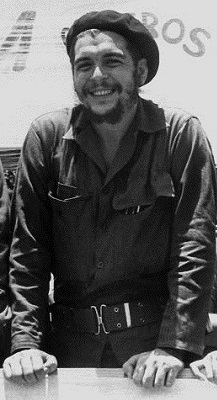|
~ Ernesto Che Guevara
~ Galéria
~ Oldal
~ Bejelentkezés
~ Vissza a Főoldalra
Ernesto Che Guevara, az argentin származású forradalmár, miniszter, gerillavezér és író, Buenos Aires-ben szerzett orvosi diplomát, majd a kubai forradalom során jelentős szerepet játszott a szigetország felszabadításában és újjáépítésében. A kubai gazdaság talpraállításáért dolgozott, küzdött az oktatás és az egészségügy fejlesztéséért, az írástudatlanság és a faji előítéletek felszámolásáért. Saját példájával népszerűsítette az önkéntes munkát. Kongóban és Bolíviában is harcolt - harminckilenc éves volt, amikor az amerikai-bolíviai csapatok csapdába ejtették és kivégezték.
| | |
|

| | |
|
|
|
1965 - 1966 A kongói kaland
|
Mára megírtam Che Guevara életrajzának újabb fejezetét - az 1965-ös év történetéről olvashattok.
Ekkor Che több afrikai országban is járt, miközben már egy újabb hadjáraton törte a fejét. Argentína még nem érett meg a forradalomra, de úgy tűnt, hogy Kongó igen.
1965 az elbukott kongói kaland éve volt - és ugyanebben az esztendőben született meg Che ötödik és utolsó gyermeke, aki édesapja és nagyapja nevét kapta: Ernesto.
Itt elolvashatjátok: [1965 - 1966 A kongói kaland]
|
|
For today I have written a new chapter of Che Guevara's biography - so you can read about the story of 1965.
That year Che visited several African countries, while he was planning a new campaign. Argentina was not ready for the revolution, but the Congo seemed to.
1965 was the year of the failed Congolese campaign - and it was also the year when Che's fifth and last child was born, who was named after his father and his grandfather: Ernesto.
Here you can read it: [1965 - 1966 Adventures in the Congo]
|
|
|
| | |
|
|
|
~ Ernesto Che Guevara
~ Gallery
~ Site
~ Log in
~ Back to the Main page
Ernesto Che Guevara, the Argentine-born revolutionary, minister, guerrilla leader and writer, received his medical degree in Buenos Aires, then played an essential part in the Cuban Revolution in liberating and rebuilding the country. He did his best to set up the Cuban economy, fought for the improvement of the education and the health system, the elimination of illiteracy and racial prejudice. He promoted voluntary work by his own example. He fought in the Congo and in Bolivia - he was thirty-nine years old, when he was trapped and executed by the joint American-Bolivian forces.
| | |
|
|

